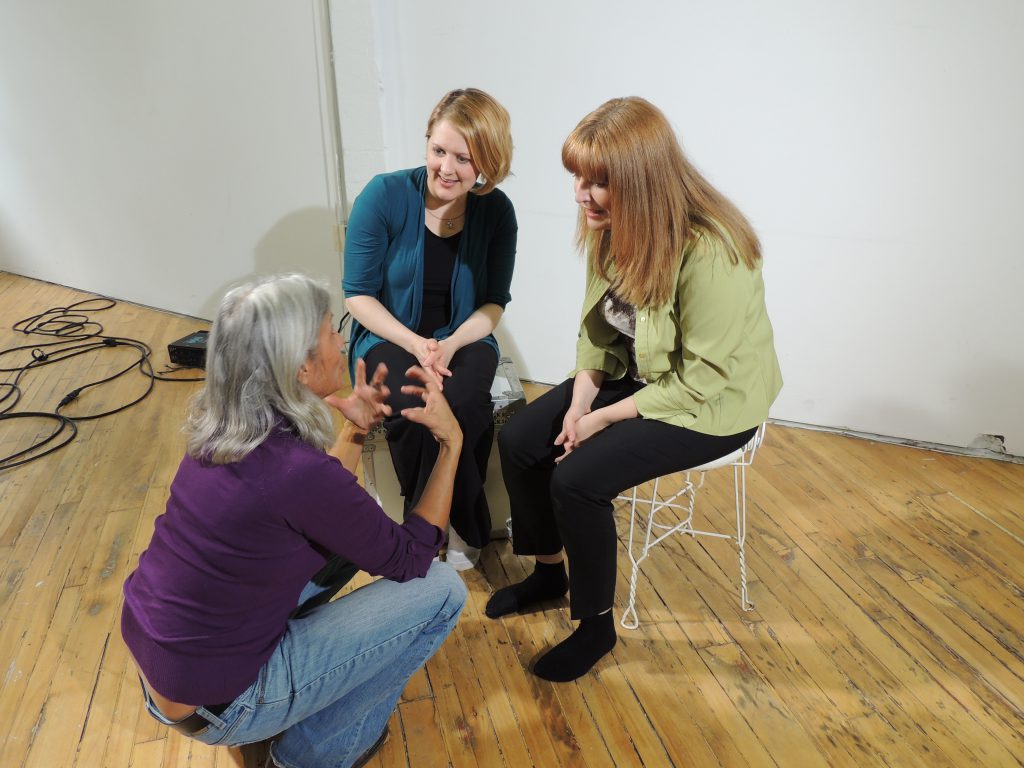ACTRA National’s Diversity and Inclusion Committee produced this practical Tips Guide for Auditioning Deaf Performers. The guide is designed to help casting professionals audition deaf actors, eliminate barriers, and promote an inclusive work environment. Interpreting in the television, film and digital screen industry requires more than just knowledge of Sign Language. It also takes knowledge of the industry. Deaf actors face unique obstacles when auditioning or performing on set. These tips help casting professionals understand the needs of deaf performers, such as understanding where to place the sign interpreter and how to frame a shot of the signing performer, so that deaf performers are able to perform the best audition or performance possible.
“The key to opening doors to great performances is through accessibility.“
Catherine Joell MacKinnon
Tips for Auditioning Deaf Performers
1. Use a Sign Language Interpreter.
2. Speak directly with the Deaf Actor, not the Interpreter.
3. Treat the Interpreter as a professional.
4. Watch the lighting: the Deaf Actor must see the Interpreter.
5. Camera framing: the Deaf Actor’s hands must be in frame so their language can be seen.
6. Sign Language Interpreter and Reader placement must be side-by-side, on the same side of the camera. The Deaf Actor can then see both Reader and Interpreter, and does not have to cross frame to do so. If Casting Directors are in attendance or viewing the audition later, following these tips will help the Deaf Actor give their best performance! Qualified ASL Interpreters adhere to the Code of Ethics and Guidelines for Professional Conduct. Certified Interpreters have graduated from a recognized Interpreter training program. (ITP)Disclaimer: Sign language interpreter fees varies as most are freelancers. Please negotiate the fees, and ask the deaf performer if there’s a preference of who would they would like to use prior to hiring the interpreter.
Resources & helpful links
- Association of Translators and Interpreters of Alberta (ATIA)
- Association of Translators, Terminologists and Interpreters of Manitoba (ATIM)
- Association of Translators and Interpreters of Nova Scotia (ATINS)
- Association of Translators and Interpreters of Ontario (ATIO)
- Canadian Association of Sign Language Interpreters (AVLIC)
- Canadian Association of the Deaf (CAD)
- Canadian Cultural Society of the Deaf (CCSD)
- Canadian Hearing Society (CHS)
- Canadian Translators, Terminologists and Interpreters Council (CTTIS)
- Canadian Video Relay Services
- Conference of Interpreter Trainers (CIT)
- Corporation of Translators, Terminologists and Interpreters of New Brunswick (CTINB)
- La Surdite au Quebec
- Ontario Association of Sign Language Interpreters (OASLI)
- Ontario Interpreting Services
- Ordre des traducteurs, terminologues et interprètes agréés du Québec (OTIAQ)
- Service D’Interpretation Visuelle Et Tactile (Quebec)
- Sign Language Interpreter Associates of Ottawa (SLIAO)
- Society for Manitobans with Disability
- Society of Deaf and Hard of Hearing Nova Scotians
- Society of Translators and Interpreters of British Columbia (STIBC)
- Translation Bureau Public Works and Government Services Canada
UNITED STATES
- California Association of the Deaf, Media, Standing Committee
- National Association of the Deaf (NAD)
- Registry of Interpreters for the Deaf, USA (RID)
INTERNATIONAL
- British Deaf Association (BDA)
- British Sign Language Interpreters
- International Council for the Development of Community Interpreting
- International Federation of Translators (FIT)
- World Association of Sign Language Interpreters (WASLI)
- World Federation of the Deaf (WFD)
ONLINE
If budgets restrict the use an ASL Interpreter, the Otter.ai Speech to Text Transcriptions App is available for download on Apple and Google Play.
Otter’s app allows you to record, transcribe, search and share your voice conversations. Essentially, it is a voice recorder that offers automatic
transcription. Otter is designed to understand and capture long form conversations that take place between multiple people.
NOTE: Before choosing the communications method for your production, it is recommended to ask the deaf actors what their preferred mode of communication is.
All links are being provided as a convenience and for informational purposes only; they do not constitute an endorsement or an approval by ACTRA of any of the products, services or opinions of the corporation or organization or individual. ACTRA bears no responsibility for the accuracy, legality or content of the external site or for that of subsequent links. Contact the external site for answers to questions regarding its content.
ACTRA would like to give a special thanks to the following people who helped create this helpful tips guide: Joanna Bennett; Julie Brar; Jani Lauzon; Catherine Joell MacKinnon; Elizabeth Morris; and Kerron Schullere.


